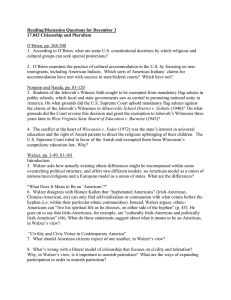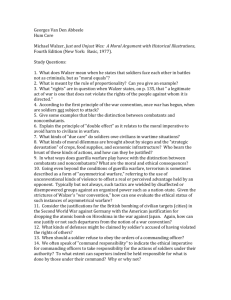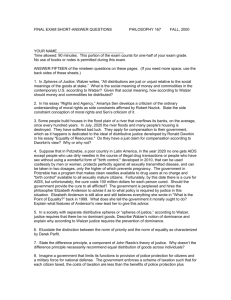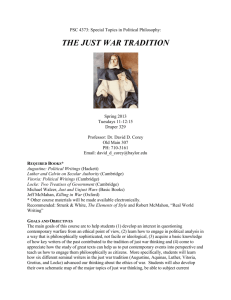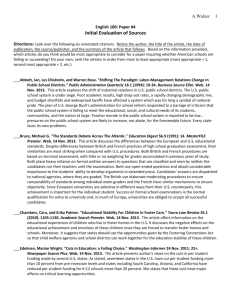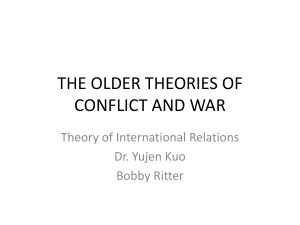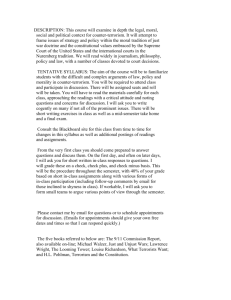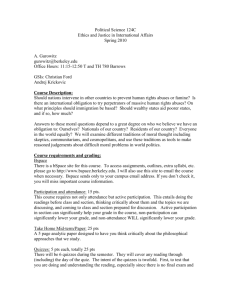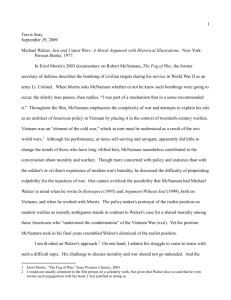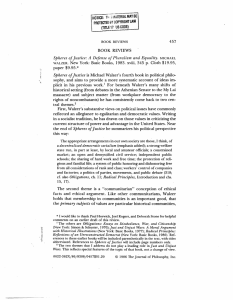Global Justice - TCU Political Science
advertisement
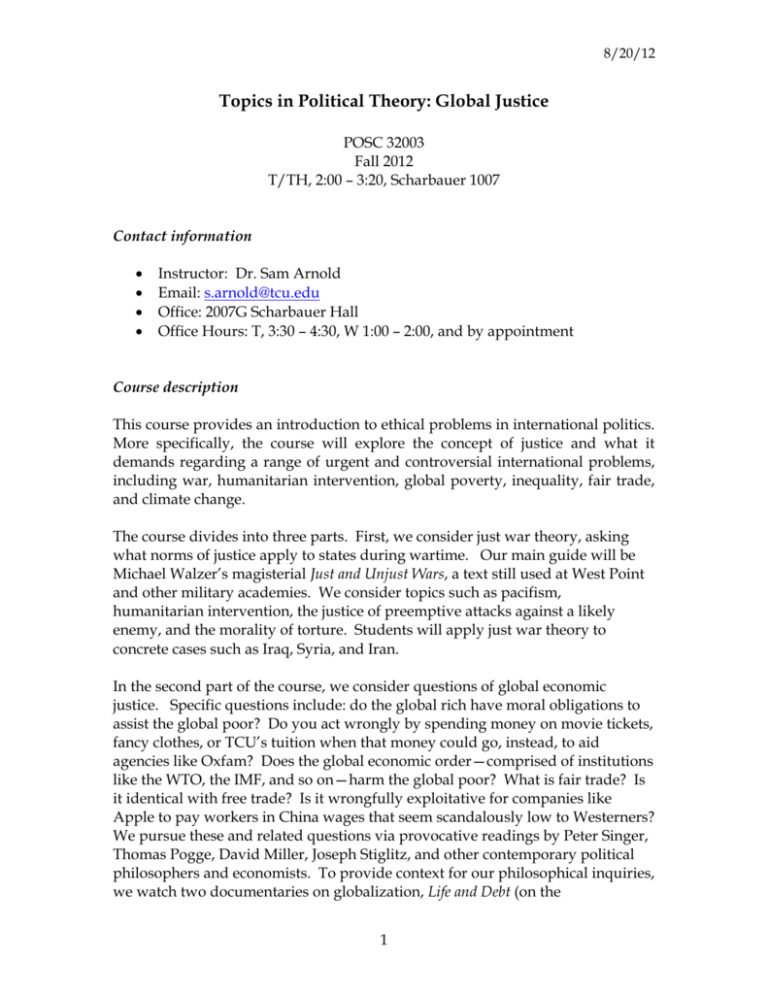
8/20/12 Topics in Political Theory: Global Justice POSC 32003 Fall 2012 T/TH, 2:00 – 3:20, Scharbauer 1007 Contact information Instructor: Dr. Sam Arnold Email: s.arnold@tcu.edu Office: 2007G Scharbauer Hall Office Hours: T, 3:30 – 4:30, W 1:00 – 2:00, and by appointment Course description This course provides an introduction to ethical problems in international politics. More specifically, the course will explore the concept of justice and what it demands regarding a range of urgent and controversial international problems, including war, humanitarian intervention, global poverty, inequality, fair trade, and climate change. The course divides into three parts. First, we consider just war theory, asking what norms of justice apply to states during wartime. Our main guide will be Michael Walzer’s magisterial Just and Unjust Wars, a text still used at West Point and other military academies. We consider topics such as pacifism, humanitarian intervention, the justice of preemptive attacks against a likely enemy, and the morality of torture. Students will apply just war theory to concrete cases such as Iraq, Syria, and Iran. In the second part of the course, we consider questions of global economic justice. Specific questions include: do the global rich have moral obligations to assist the global poor? Do you act wrongly by spending money on movie tickets, fancy clothes, or TCU’s tuition when that money could go, instead, to aid agencies like Oxfam? Does the global economic order—comprised of institutions like the WTO, the IMF, and so on—harm the global poor? What is fair trade? Is it identical with free trade? Is it wrongfully exploitative for companies like Apple to pay workers in China wages that seem scandalously low to Westerners? We pursue these and related questions via provocative readings by Peter Singer, Thomas Pogge, David Miller, Joseph Stiglitz, and other contemporary political philosophers and economists. To provide context for our philosophical inquiries, we watch two documentaries on globalization, Life and Debt (on the 1 8/20/12 consequences of globalization for Jamaica) and Black Gold (on the coffee trade in Ethiopia). In the final part of the course we turn to climate change. To bone up on the science of climate change, we watch Six Degrees Could Change the World, a National Geographic documentary. Then we focus on the ethics of climate change. Responding to climate change will be very costly. Should we pay these costs, and if so, how should they be distributed? Should high-polluting nations pay more than low-polluting ones? We also consider questions of individual responsibility. Do you have an obligation to recycle? Is it wrong to buy a gas guzzling Ford pickup rather than a Toyota Prius? Learning goals This class will help students learn to… o Read difficult texts critically, carefully, and deeply o Think critically and independently about pressing normative issues (like war, global poverty, and climate change) o Write argumentative essays with clarity, rigor, and grace o Engage in respectful, intellectually serious debate about controversial political topics and values o Understand the major theoretical positions on various topics in global justice: just war theory, global economic justice, climate change, etc. Required texts o Michael Walzer, Just and Unjust Wars, 4th edition o Reading packet, available for purchase in the Political Science department Overview of assignments o Argumentative Essay 1. 6-8 pages. Topics to be distributed. Some topics may require the student to perform independent research. (For instance, one possible essay topic might be the justice of the Iraq war; to respond satisfactorily, you might need to do some independent research to familiarize yourself with the basic facts of the war.) Due Sunday, October 21st by 11:59 PM. 2 8/20/12 o Argumentative Essay 2. 6-8 pages. Topics to be distributed. Some topics may require the student to perform independent research. Due Sunday, December 2nd by 11:59 PM. o Final exam. Date and time TBA. This exam will be comprehensive in its coverage: anything from the first class to the last is fair game. It will consist of short answer questions, multiple choice questions, and longer essay questions. The exam will test your comprehension of the course readings and will ask you to engage critically with these readings. o Unannounced reading quizzes. These pop quizzes will be short—they should take no more than 5 minutes to complete. And they should be easy, provided you have done the reading carefully. Number of quizzes to be determined. I will drop your lowest score. Grading policy Your course grade will be a function of the following: o o o o o Essay 1 (20%) Essay 2 (25%) Final Exam (25%) Reading quizzes (15%) Participation (15%) Assignments will be graded on the usual A - F scale, with numerical values as follows: A A/AAA-/B+ B+ B+/B B B/BBB-/C+ C+ C+/C C CD+ D 4.000 3.85 3.700 3.500 3.300 3.150 3.000 2.850 2.700 2.500 2.300 2.150 2.000 1.700 1.300 1.000 3 8/20/12 F 0 I will say more about grading standards—that is, what it takes to get an A, a B, and so on—when we discuss the first paper assignment. A word on participation People learn political theory best by doing it: that is, by discussing and criticizing arguments and ideas with other people. Accordingly, I will give you ample opportunity to participate in class, which I hope will resemble a seminar more than a lecture. However, this strategy will work only if you arrive to class willing and able to discuss the readings in an informed, critical way. So please do prepare conscientiously for class. I recognize that some students are reluctant to speak in class. I understand their reluctance, but I encourage them to work through it. Learning to present ideas and raise questions in a group setting is a crucial part of your college education. However, if you find yourself unable to speak regularly in class, come see me during office hours and we can discuss other ways in which you might participate. Course Policies My course policies rest on three principles. Course policies should a) create an effective learning environment; b) treat all students fairly; and c) treat students as adults: that is, as people who are worthy of respect and accountable for their actions. The following policies reflect these three principles. Attendance: You are required to attend class. Absences will negatively affect your participation grade. If you have to miss class for a legitimate reason, let me know as far in advance as possible. Please note: there will be no makeups for reading quizzes. So if you miss class (without legitimate reason) on the day of an unannounced reading quiz, you will get a zero for the quiz. Late work: You are required to hand assignments in on time. Late assignments will be penalized 2/3 of a letter grade per day. (So an A paper that is one day late will drop from an A to a B+.) This penalty will be waived if and only if you have a legitimate excuse. It is not possible to define the category of “legitimate excuse” exhaustively, but examples will give you the general idea. 4 8/20/12 o Legitimate excuses include: severe, documented illness; documented family or personal crisis (death in the family, etc.). o Here are a few excuses that won’t cut the mustard: “I had a lot of work this weekend.” “My fraternity/sorority/church group/anarchist cell threw a party and I couldn’t work on the paper.” “I was so busy with sports/the student newspaper/my intramural team/my job that I couldn’t fit in the assignment.” Laptops/phones/etc.: My policy here is simple. Use laptops for notetaking and for accessing any course materials that may be online. Do not use them for anything else. That means, for example, no internet surfing, no Facebook, no email, etc. etc. Same goes, of course, for phones and other devices. I may implement a more draconian policy if laptop use proves too distracting. Information for Students with Disabilities Texas Christian University complies with the Americans with Disabilities Act and Section 504 of the Rehabilitation Act of 1973 regarding students with disabilities. Eligible students seeking accommodations should contact the Coordinator of Services for Students with Disabilities in the Center for Academic Services located in Sadler Hall, 11. Accommodations are not retroactive, therefore, students should contact the Coordinator as soon as possible in the term for which they are seeking accommodations. Further information can be obtained from the Center for Academic Services, TCU Box 297710, Fort Worth, TX 76129, or at (817) 257-7486. Adequate time must be allowed to arrange accommodations and accommodations are not retroactive; therefore, students should contact the Coordinator as soon as possible in the academic term for which they are seeking accommodations. Each eligible student is responsible for presenting relevant, verifiable, professional documentation and/or assessment reports to the Coordinator. Guidelines for documentation may be found at http://www.acs.tcu.edu/DISABILITY.HTM. Students with emergency medical information or needing special arrangements in case a building must be evacuated should discuss this information with their instructor/professor as soon as possible. Academic Misconduct 5 8/20/12 (From section 3.4 from the Student Handbook) Any act that violates the academic integrity of the institution is considered academic misconduct. The procedures used to resolve suspected acts of academic misconduct are available in the offices of Academic Deans and the Office of Campus Life and are listed in detail in the Undergraduate Catalog (available online @ http://catalog.tcu.edu/undergraduate/). Specific examples of academic misconduct include, but are not limited to: Cheating: Copying from another student’s test paper, laboratory report, other report, or computer files and listings; using, during any academic exercise, material and/or devices not authorized by the person in charge of the test; collaborating with or seeking aid from another student during a test or laboratory without permission; knowingly using, buying, selling, stealing, transporting, or soliciting in its entirety or in part, the contents of a test or other assignment unauthorized for release; substituting for another student or permitting another student to substitute for oneself. Plagiarism: The appropriation, theft, purchase or obtaining by any means another’s work, and the unacknowledged submission or incorporation of that work as one’s own offered for credit. Appropriation includes the quoting or paraphrasing of another’s work without giving credit. Collusion: The unauthorized collaboration with another in preparing work offered for credit. Simply put, don’t cheat. Cheating robs you of the opportunity to learn and betrays a lack of character and self-respect. Do you want to be the sort of person who cheats his way through life? Plus, from a purely self-interested point of view, cheating is a bad bet. I will probably catch you and the consequences are grim. Trust me: it’s much better to write an awful paper and get a disappointing (but passing) grade than it is to cheat and get a zero for the assignment, plus whatever other consequences follow from violating the school’s honor code. 6 8/20/12 Schedule of Topics and Readings1 Unit 1: Does the idea of global normative theory even make sense? 1. T, August 21. Introduction to the course. Reading: o Helena De Bres, “The Pink Guide to Taking Philosophy Classes,” pp. 3-10 2. Th, August 23. Realism: a nation’s gotta do what a nation’s gotta do Reading: o Thucydides, The Melian Conference, from The History of the Peloponnesian War o Michael Walzer, Just and Unjust Wars (JUW), 3-13. o Charles Beitz, “The Truth in Realism,” from the Afterword to Political Theory and International Relations 3. T, August 28. Relativism: isn’t morality just a matter of opinion? Reading: o James Rachels, excerpt from The Elements of Moral Philosophy 4. Th, August 30. Class cancelled—I’m away at a conference. Reading: o Use this time to read ahead! Unit 2: Just War Theory Can there be a just war? The appeal of pacifism 5. T, Sept 4. Pacifism and the idea of a just war Reading: o “Pacifism,” from Stanford Encyclopedia of Philosophy, pp. 12, 8-21 [section 2: Varieties of Pacifism] o Jan Narveson, “Pacifism: A Philosophical Analysis” 6. Th, Sept 6. Pacifism, continued Unless otherwise noted, all readings are available in the reading packet except for those found in Walzer’s Just and Unjust Wars. Schedule of readings may change at my discretion. 1 7 8/20/12 Reading: o Martin Benjamin, “Pacifism for Pragmatists” o “Pacifism,” SEP, pp. 21-32, 37-43 [sections 3, 4, and 6] Just war theory: an overview 7. T, Sept 11. The Catholic roots of just war theory Reading: o John Finnis, “The Ethics of War and Peace in the Catholic Natural Law Tradition” [Available online via ecollege] o US Conference of Catholic Bishops, The Challenge of Peace (section 3: The Just War Criteria, paragraphs 80-110) Jus ad bellum: justice in the resort to war 8. Th, Sept 13. Walzer and the “legalist paradigm” Reading: o Walzer, JUW, pp. 21-33, 51-73 9. T, Sept 18. Wars of self-defense: preemption versus prevention Reading: o Walzer, JUW, pp. 74-85 o “The National Security Strategy of the United States” o Neta Crawford, “The Best Defense” 10. Th, Sept 20. More on preventive war Reading: o Jeff McMahan, “Preventive War and the Killing of the Innocent” o Economist debate on war with Iran o Read through The New York Times’ briefing on Iran’s nuclear program: http://topics.nytimes.com/top/news/international/cou ntriesandterritories/iran/nuclear_program/index.html Humanitarian intervention 11. T, Sept 25. Walzer and Luban on humanitarian intervention Reading: 8 8/20/12 o Walzer, JUW, pp. 86-97, 101-108 o David Luban, “Just War and Human Rights” 12. Th, Sept 27. Walzer and Luban, round 2 Reading: o Walzer, “The Moral Standing of States” o Luban, “The Romance of the Nation-State” 13. T, Oct 2. Humanitarian intervention: a case study (Iraq) Reading: o Fernando Teson, “Ending Tyranny in Iraq” o Terry Nardin, “Humanitarian Imperialism” 14. Th, Oct 4. In class writing workshop Reading: o Two student essays, available on ecollege o Zachary Seech, “Thesis Defense Papers” o Helena De Bres, Pink Guide to Philosophy, pp. 11-17 FALL BREAK: OCTOBER 8-10 Jus in bello: justice in the conduct of war 15. Th, Oct 11. Walzer on the “war convention” Reading: o Walzer, JUW, pp. 34-46, 127-146. 16. T, Oct 16. McMahan’s challenge to Walzer Reading: o Jeff McMahan, “The Ethics of Killing in War” 17. Th, Oct 18. Torture Reading: o Ben Juratowitch, “Torture is Always Wrong” o Jeff McMahan, “Torture in Principle and in Practice” FIRST ESSAY DUE SUNDAY, OCTOBER 21st by 11:59 PM Unit 3: Global Economic Justice 9 8/20/12 Responses to global poverty, I: a duty of assistance? 18. T, Oct 23. Peter Singer and the positive duty to give Reading: o Peter Singer, The Life You Can Save, pp. 1-19, 23-41 19. Th, Oct 25. Two skeptical responses to Singer. Reading: o John Kekes, “On the Supposed Obligation to Relieve Famine” o Garrett Hardin, “Lifeboat Ethics” 20. T, Oct 30. Another response to Singer. Reading: o Richard Miller, “Beneficence, Duty and Distance” Responses to global poverty, II: a duty not to harm? 21. Th, Nov 1. In class film: Life and Debt Reading: o Joseph Stiglitz, Making Globalization Work, Ch 2 o Robert Skidelsky, “Gloomy About Globalization,” Review of Making Globalization Work 22. T, Nov 6. Does the global order harm the poor? Reading: o Thomas Pogge, “Recognized and Violated by International Law: The Human Rights of the Global Poor” o Matthias Risse, “Do We Owe the Global Poor Assistance or Rectification?” Trade: what is the relationship between free trade and fair trade? 23. Th, Nov 8. In class film: Black Gold. Reading: o Joseph Stiglitz, Making Globalization Work, Ch. 3 o Jagdish Bagwati, In Defense of Globalization, Ch. 5 24. T, Nov 13. Discussion of movie and fair trade 10 8/20/12 Reading: o David Miller, “Fair trade: what does it mean and why does it matter?” Labor standards: justice, responsibility, sweatshops 25. Th, Nov 15. Are sweatshops immoral? Reading: o “In China, Human Costs Are Built Into an iPad,” New York Times, January 25, 2010 o Nicholas Kristof, “Where Sweatshops are a Dream,” NYT o Jeremy Snyder, “Needs Exploitation” o Benjamin Powell and Matt Zwolinski, “The Ethical and Economic Case Against Sweatshop Labor: A Critical Assessment,” pp. 466-471 26. T, Nov 20. Sweatshops, global justice, and moral responsibility Reading: o Iris Marion Young, “Responsibility and Global Labor Justice” THANKSGIVING BREAK – no class Th, Nov 22 Unit 4: Climate Change 27. T, Nov 27. In-class movie: Six Degrees Could Change the World Reading: o Stephen Gardiner, “Ethics and Global Climate Change” 28. Th, Nov 29. Climate change and the moral obligations of states Reading: o Peter Singer, “One Atmosphere” o Bjorn Lomborg, “The Truth About the Environment” ESSAY 2 DUE SUNDAY, DECEMBER 2nd AT 11:59 PM 29. T, Dec 4. Climate change and the moral obligations of individuals Reading: 11 8/20/12 o Walter Sinnott-Armstrong, “It’s Not My Fault: Global Warming and Individual Moral Obligations” o James Garvey, “Climate Change and Causal Inefficacy: Why Go Green When It Makes No Difference?” 12
